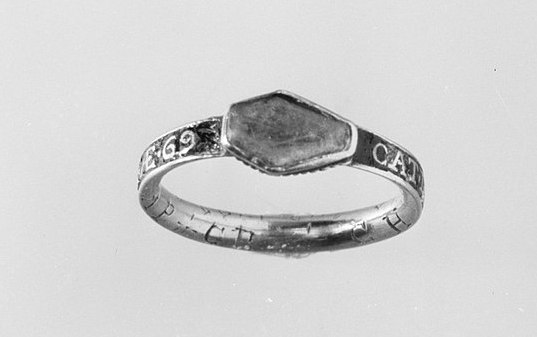March 08, 2018
Mortality Merch: 'Funeral Swag' Was A Thing
While you may receive a prayer card or program at funerals these days, the mortal occasions are probably not the first place you’d expect to find customized products being given away. But in Colonial-era New England, providing free “swag” at funerals was apparently commonplace.
No, for real.

An 18th Century mourning ring containing the deceased person’s hair. From JSTOR Daily, via Wikimedia Commons.
In a fascinating academic paper, historians Sheila McIntyre and Steven C. Bullock explain that funeral attendees and mourners in 18th Century New England received everything from gloves and scarves to rings bearing the late individual’s name. In fact, it would have been something of a social faux pas if so-called “funeral tokens” were not provided. “Only in eighteenth-century New England were elites expected, virtually required, to give freely to everyone at the funeral,” Bullock and McIntyre relate.
In an interesting article discussing the historians’ paper, Erin Blakemore of JSTOR Daily, an online publication that contextualizes current events with scholarship, shared that the presenting of the funeral tokens often denoted who held the closest spots in the passed person’s heart. That’s because they were typically first given to pallbearers, close family members and dear friends. Sometimes, people not in attendance got the giveaways, too. Recipients were known to collect the mortality merch and pass items on to loved ones upon their own deaths.
“It makes sense that funerals played an important role in Colonial society—there were a lot of them,” Blakemore writes. “Funerals were places to see and be seen, and people felt social pressure to give gifts at funerals (not to mention supplying every attendee with rum).”
As it happened, a legal clampdown and changing times and customs ushered in an end to the practice of funeral tokens.
“Finally, in 1742, Massachusetts banned giving rings, scarves, and large numbers of gloves at funerals in an attempt to curb spending,” Blakemore states. The American Revolution played a part in nixing funeral tokens, too. “The massive funerals of eighteenth-century New England were expensive,” JSTOR Daily reports, “but they soon became unnecessary social rituals to a society swept up in rebellion and then full-blown revolution. Funerals became more subtle, mourning less extravagant, and commemorating the dead slightly less fabulous.”
Do check out Blakemore’s article and Bullock and McIntyre’s paper for more in-depth details about the nearly forgotten practice of funeral tokens.